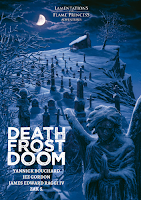24. Share a PWYW publisher who should be charging more.
Answer: I was thinking about skipping this question, yet it might be my longest answer yet. Although I've checked out a couple PWYW games, I haven't really explored them fully or played them so I felt any suggestion I might give would hold little weight. However, the more I thought about it, this question isn't just about sharing somebody whose work is of a caliber that deserves more attention or more money. This question touches on they very structure of the RPG industry and how PWYW fits into its future, or whether it's a positive or negative part of the industry at all. I'm not sure I have a clear answer.
First, it might be helpful to look at what purpose a Pay-What-You-Want price model serves. To my mind, the entire point of PWYW is to gain traction as a game designer for a new system. By allowing people to have it for free and contribute money if they wish, it encourages people to take a chance on a new game and spread the word about it if they like it. It also puts it out there into the world to invite criticism and feedback, which the designer can use to make improvement. This all sounds great, so what about the PWYW model gives me pause?
This model creates an expectation in a lot of gamers not to pay for a new game. This means independent game designers who do want to invest a little more money into their game may find it hard to interest people in buying it if there are a ton of other new games to be had for free. Between the OGL license and the rise of print-on-demand self-publishing and online distribution, nearly anyone can turn their house rules into a PWYW game available to download on DriveThruRPG or RPGNow. While that open access is very democratic, it's also created a glut of games that are very similar and an incestuous marketplace of independent game designers all buying each other's games in a show of support and mutual validation. All of these free games of varying quality also create a demarcation line of legitimacy between themselves and the games produced by the big corporations. By saying, "tell me how much my game is worth," there's an immediate, unspoken implication that your game isn't worth as much as what Wizards of the Coast or Paizo are putting out.
The initial investment to get into the current edition of Dungeons & Dragons or Pathfinder is roughly $100.00 in books,
assuming you're not buying the starter sets. While relatively
inexpensive compared to other hobbies, it is by no means affordable for
everyone, particularly someone in their preteens like I was when I began
gaming. Now, there are plenty of RPGs that fall in between free and $100. It's just that these games face an uphill battle fighting for market share among the countless PWYW (free) games and the brand recognition of the bigger titles.
Although it's technically not PWYW, my favorite game right now, Basic Fantasy,
gives away full-art PDF versions of their books for free from their
website and prices their print-on-demand versions at cost (between $3.50
and $5.00 a piece). There's also a wealth of great supplemental
material available for free from the site as well. The content is generated and play-tested by the community of gamers, for other gamers through a collaborative process. I fully support this model. It manages to be very democratic, yet takes the capitalistic,
for-profit consumerist drive out of game design. What do I mean by this?
By making physical copies available at cost, you assert the game is at least worth the paper it's printed on, while still making it very easy for people to take a chance on it. Instead of making the big corporate games seem more legitimate, pricing your game at cost makes those corporate games seem like a rip-off. It lays bare the practice of coming out with new versions of a game every few years just to make your players buy everything all over again, or releasing a neverending stream of inessential splatbooks and skimpy hardcover supplements. Finally, if you charge a reasonable, set price for something, the more likely I am to buy it. The fact that Chris Gonnerman has kept his BFRPG books at cost has meant that I've bought all of them, even though the PDFs are free.
So, what have I decided after all this? I'd say that all PWYW publishers deserve to paid more, even if it's very little. If I were to single one out, I would pick Questing Beast's Maze Rats. He put a lot of thought into the rules and the layout. It has a small enough page count that if you download it, it's very easy to print out a physical copy.
Subscribe to:
Post Comments (Atom)
GM Notes - Morgansfort Session 14 - Death Frost Doom - Part 2 of 2
So, here stands the final chronicle of my two-year Basic Fantasy campaign. It ended a year ago and I'm just now getting around to fini...

-
Jeff Easley's BECMI Thief I’ve recently decided to run an OD&D game. This, of course, brings with it the age-old question of whi...
-
It is around 11:30 p.m. Father Thelbain acts quickly and has his acolytes clean up the remains of the dead, mute cultist, Brother Malach...
-
So, here stands the final chronicle of my two-year Basic Fantasy campaign. It ended a year ago and I'm just now getting around to fini...




No comments:
Post a Comment